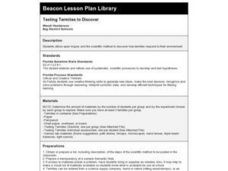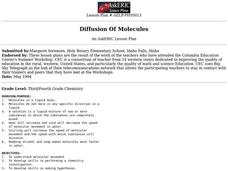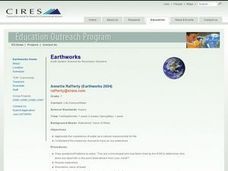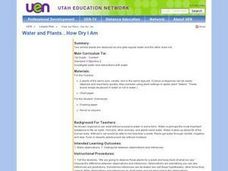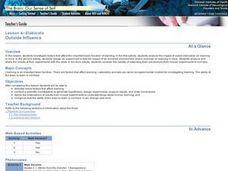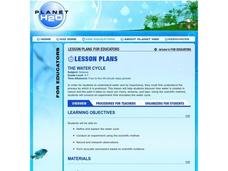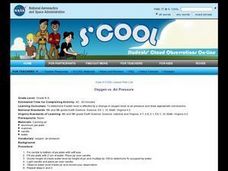Curated OER
Testing Termites to Discover
Students design an experiment to discover how termites respond to their environment.
Curated OER
Stranded along the Coast
Young scholars plot stranding sites onto a map using latitude and longitude as well as compass directions with respect to coastal features. They identify several species of marine animals that might become stranded; distinguish their...
Curated OER
Water Quality and Temperature
Students evaluate the effects of temperature changes on the metabolic rate of a clam. Conclusion questions are addressed which help students to process and articulate their experiences.
Curated OER
Matter And Its Changes
Fifth graders explore the phases of matter, make observations of matter, the physical and chemical properties of matter, solutions and mixtures, formation of molecules and atoms and molecules all through hands on activities.
Curated OER
Stream Habitats and Biota
Learners identify native and introduced species of fish, shellfish and insects that inhabit Hawaii's streams. They use this information to predict the impact of stream restoration projects in Hawaii.
Curated OER
Diffusion Of Molecules
Students investigate molecular movement while studying how to perform a chemistry investigation.
Curated OER
MAPPING A RESEARCH SITE AND COLLECTING AND PRESENTING POPULATION DATA
Sixth graders are to answer research questions based on data they collect.
Curated OER
Urban Impact on Chollas Creek (California): A Field Study
Students, in groups, take samples from a creek and keep a field journal on their samples. They also perform tests on their samples.
Curated OER
Earthworks
Seventh graders explore watersheds and take samples and analyze the data from a watershed in the area.
Curated OER
Owl Pellet Lesson Plan
Students construct and identify a skeleton from the bones dissected from an owl pellet. They glue the bones on construction paper, label the page, and identify the animal.
Curated OER
Water and Plants...How Dry I Am
First graders observe two similar plants as one gets water and the other does not. They make predictions and chart the growth of each. They draw pictures of the plants after one week.
Curated OER
Multiplying Microbes
Middle schoolers examine environmental conditions that effect bacteria growth. They culture bacteria, design and conduct an experiment, and identify the conditions that effected the bacteria growth using the scientific method.
Curated OER
It's in the Garbage
Students analyze how studying garbage relates to methods of archaeology. They examine garbage to determine things about their culture and relate that to prehistoric peoples.
Curated OER
OUtside Influence
Pupils identify factors that are important for brain functioning of learning. They observe the impact of interaction in mice. They also create their own experiment dealing with the mice. They analyze and share their results.
Curated OER
Create Your Own Investigation
Students design and implement an experiment intended to measure and analyze the air quality of a particular location. They focus on looking for ozone and particulate pollutants.
Curated OER
Analyze the Results
Learners conduct water tests and sample macroinvertebrates from a nearby source to make a general determination about the overall quality of water. They use worksheets and analyze data as part of a larger unit.
Curated OER
The Water Cycle
Young scholars research the water cycle and identify main vocabulary associated with the water cycle. They build and observe a closed system model that demonstrates the water cycle in action.
Curated OER
Draw your Conclusions
Students analyze data from a student discussion website and write a report on the outcome of an investigation regarding their local water quality. As part of a larger unit students then post the summary of their investigation on the...
Curated OER
Bird Beak Anatomy
Third graders participate in an activity to determine which tool will work the best to gather food. They create analogies about how the experiment relates to birds. They brainstorm about which adaptation helps or hurts the survival of an...
Curated OER
New Jersey Estuaries
Students experiment to discover that salt water is denser than fresh water by creating color coded solutions. They examine how heavy rainstorms and high tides develop layers of different degrees of density.
Curated OER
Flow Rates of Faucets and Rivers
Students work together to discover the flow rates of faucets and rivers. They relate their results to engineering and applied science concepts. They make predictions on the flow rate of a nearby river in their local community.
Curated OER
Temperature Variations and Habitability
Students, in groups, evaluate conditions outside the building and inside the classroom using thermometers, barometers, anemometers, etc. They compare interior and exterior conditions. They consider and discuss factors that contribute...
Curated OER
Oxygen vs. Air Pressure
Students conduct an experiment to determine if water level is affected by a change in oxygen level or air pressure.
Curated OER
Now Hear This!
Students investigate their hearing range. They participate in a week-long hearing experiment, listening for various sounds during recess time, and determining which noises were easier or more difficult to hear.
Other popular searches
- Scientific Method Hypothesis
- Writing Hypothesis
- Gaia Hypothesis
- Making a Hypothesis
- Writing a Hypothesis
- Hypothesis Writing Labs
- Creating a Hypothesis
- Origin of Life Hypothesis
- Hypothesis Worksheets
- Practice Writing Hypothesis
- Hypothesis Generation
- Gaea Hypothesis


